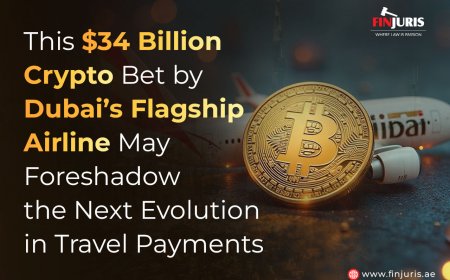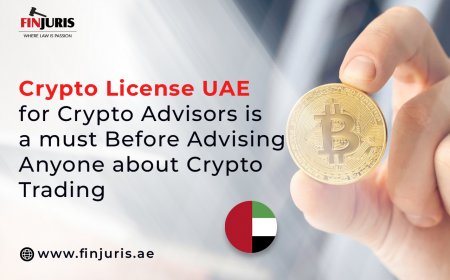How to Buy and Sell Cryptocurrency in UAE
Learn how to buy and sell cryptocurrency in the UAE securely and legally with this step-by-step guide for beginners and experienced users.

In recent years, the United Arab Emirates (UAE) has rapidly became one of the most cryptocurrencies-friendly countries in the world. With regulatory clarity and business new thinking, Dubai and Abu Dhabi are truly leading by example for blockchain adoption and digital asset acceptance. The mainstream adoption of digital tokens such as bitcoin, Ethereum, and stable coins by residents, tourists, and businesses is certainly putting the UAE the on the Web3 map.
Duba's Virtual Assets Regulatory Authority (VARA), in addition to Abu Dhabi's ADGM (Abu Dhabi Global Market), have laid the groundwork and will bring an inclusive but strict and non-disruptive regulatory framework to crypto. The global investment interest has attracted global investment from investors, exchanges, Web3 startups, and developers.
Whether you are looking for how to buy cryptocurrency in UAE, or if you just have questions on what is the safest and legal way to trade crypto in UAE, this guide will include everything you need to know about, including how to buy, sell and store cryptocurrency, and establish a crypto business within UAE legally and safely.
Read More: Blockchain Legal Services Are Revolutionizing the Legal Industry
Legal Framework of Cryptocurrency in the UAE
Is Cryptocurrency Legal in the UAE?
The short answer is yes. While cryptocurrency is legal in the UAE, it can only be traded from licensed exchanges. Individuals and businesses can buy and sell cryptocurrency in the UAE provided the proper KYC (Know Your Customer), AML (Anti Money Laundering), and compliance of-their-duty protocols are followed. VARA and ADGM (Abu Dhabi Global Market) are the main regulators for digital asset activities.
VARA and ADGM
- VARA: (Dubai) The Virtual Asset Regulatory Authority (VARA) established in 2022, is the regulator for virtual assets in all of Dubai except the Dubai International Financial Centre (DIFC). VARA requires exchanges, wallet providers, brokers, and advisory services to be licensed.
- ADGM (Abu Dhabi): The FSRA (Financial Services Regulatory Authority) is responsible for regulating crypto businesses in Abu Dhabi (ADGM). It provides clear guidance for the trading landscape, including trading, custody, token issuance, DeFi, etc.
Read More: What Is a VARA License? A Guide to Dubai's Regulatory Gold Standard for Virtual Assets
Crypto Licensing and Compliance
A virtual asset exchange or service provider in the UAE must apply for a license as a Virtual Asset Service Provider (VASP) from VARA, or an FSP license from ADGM. They must also implement robust AML/KYC frameworks, undertake risk assessments, and file reports on compliance regularly.
Read More: Key Considerations While Applying for a VARA License Dubai
Purchasing Cryptocurrency in UAE
Preconditions Before Purchase
Before purchasing cryptocurrency in UAE, please ensure you have:
- KYC Verification: Most exchanges will require KYC (Know Your Customer) verification that may include passport/Emirates ID, and proof of address.
- A Crypto Wallet: You may choose a custodial wallet (where the exchange manages the encryption and safety) or a non-custodial wallet (where you manage your private key, like MetaMask, Ledger).
- Bank Account or Card: A UAE bank account or credit/debit card to link to your exchange makes it easier to buy and sell cryptocurrency with AED currency.
Read More: Crypto Exchange License UAE: How to Legally Run Your Crypto Exchange in the United Arab Emirates?
Top Platforms to Buy Crypto in UAE
There are many exchanges that are regulated, or widely used, in the UAE:
|
Exchange |
Features |
Fees |
Regulation |
|
Binance MENA |
Wide range of coins, low fees |
~0.1% |
VARA-compliant |
|
BitOasis |
UAE-focused, easy for beginners |
0.25%–0.5% |
VARA registration |
|
eToro |
Social trading, multi-asset platform |
1% |
Global licenses |
|
Crypto.com |
Visa card integration, good mobile app |
0.4% |
Global |
Different platforms support several fiat options, so when considering the best crypto exchange in UAE, you should analyze comparisons on fees, liquidity, and support.
Payment Methods Available
These days, most platforms offer many funding options:
- Credit/Debit Card: The quickest method but comes with 1–4% fees.
- Bank Transfer: Slower method, but better for large payments. Ensure the exchange supports AED.
- Peer-to-Peer (P2P): Purchase directly from other users. Best for privacy and better rates, but discretion is needed to avoid scams.
Selling Cryptocurrency in the UAE
Selling Options
To sell your cryptocurrency in UAE, you can use:
- Licensed Exchanges: The easiest and most secure method to sell: you sell and withdraw an AED amount to your bank account.
- OTC Desks: Over-the-counter desks will allow you to sell high volumes and provide you with price based on transactions.
- P2P Platforms: You sell your crypto at a price you want and sell to buyers in your location. Check buyer reputations and make sure you use the escrow provided by the platform.
How to Withdraw to Your Bank
Once your crypto is sold, you can withdrawal your profit to a UAE bank account:
- Bank Compatibility: Use exchanges that will allow AED withdrawal to mainland UAE banks.
- Withdrawal Speed: Should be between a few minutes to 1 - 2 business days depending on your method of transfer.
- Tax: There is no longer a personal capital gains tax on crypto in the UAE (as of 2025). However, companies trading in cryptocurrencies will need to keep proper accounts and may be liable to pay UAE corporate tax (9% from June 2023).
Trading Cryptocurrency in the UAE: Safest Options
Licensed Platforms
When trading cryptocurrencies in Dubai or Abu Dhabi, it's important to only use licensed crypto exchanges. Licensing protects you and gives you legal options when disputes arise.
Red Flags
- Exchanges that pay unreasonable returns
- Platforms without a physical location or don't seem to be regulated
- Requests for private key or seed phrases
Cold Storage for High-Value Holdings
Transfer amounts you do not want to risk losing to cold wallets (offline storage such as Ledger or Trezor) where you cannot lose the funds to someone stealing them online. Only keep what you are actively trading in hot wallets.
Read More: Difficult But Worth Obtaining Crypto Exchange License
Cryptocurrency Taxation and Reporting in the UAE
2025 Tax Status
- Individuals: Individuals do not pay tax on capital gains from their crypto trades.
- Businesses: Businesses must get profiled for profits, record them in ledgers, and may also qualify for UAE's 9% corporate tax if the profit exceeds AED 375,000.
Future Trends
As global tax laws change and adapt, it is likely that the UAE creates more concrete tax frameworks as it relates to virtual currency. It is advisable to consult with a cryptocurrency consultant in Dubai to remain compliant.
Read More: Crypto Consulting Services: Navigating the Future of Digital Finance
Risks and Tips for First-Time Buyers/Sellers
- Volatility: The value of cryptocurrencies is extremely volatile and should not invest any more than you are comfortable losing.
- False Exchanges: Use only well-known and regulated exchanges.
- Unknown fees: Understand all fees (trading, deposit, withdrawal) before you make any commitments.
- Confirm wallet addresses: Cryptocurrency transactions cannot be reversed (always double-check wallet addresses, use QR codes).
- Educate: Keep track of cryptocurrency regulations throughout UAE 2025 on the VARA and ADGM portals.
How to Get Licensed if You Want to Trade as a Business
Interested in launching a crypto brokerage, or exchange, or over-the-counter desk?
Steps to Get Licensed:
- Choose your jurisdiction (Dubai (VARA) or Abu Dhabi (ADGM))
- Define your services (Exchange, custody, advisory, NFT, etc.)
- Submit application with a detailed business plan, compliance manual, and AML/KYC policies
- Complete fit-and-proper tests for directors and key personnel
- Ensure ongoing maintenance of minimum capital and requirement for submission of audits
Legal Assistance Matters
You should form a relationship with a crypto consulting agency like Finjuris or others to help you with documentation, dealing with regulators, corporate setup, etc. A cryptocurrency consultant in Dubai can save time for approvals and prevent you from making mistakes that could cost you more in the long run.
Perks of Licensing
- Trust from investors, banks, and clients
- Ability to establish partnerships both locally and internationally
- Decreased risks of legal action and regulatory review
The United Arab Emirates is not only welcoming cryptocurrency but is also leading the international future of blockchain innovation. Through clear regulation, clear partnerships, and clear infrastructure, UAE positioned itself to be a trusted and agile landscape for digital asset adoption. If you are an expat resident, a first-time investor, or an international business, learning how to buy crypto in UAE and sell cryptocurrency in the UAE safely and legally is no longer optional; it is essential for navigating this market.
The open UAE legal framework for activities, with regulators such as VARA in Dubai and ADGM in Abu Dhabi, provide unparalleled transparency to any parties looking to trade, invest, or create a blockchain company. The opportunities are aplenty, but with opportunity comes responsibility. Always use regulated and licensed cryptocurrency exchanges and platforms; store your digital assets in a secure wallet (preferably cold storage for larger amounts); and remain vigilant to scams and unverified platforms. Importantly, the cryptocurrency regulations UAE 2025 outlook provides ongoing clarifying guidance for license and how to protect your compliance. These international compliance expectations are evolving continuously.
For more complicated requirements as a large volume trade, licensed exchange operations, or regulatory compliance needs, we strongly recommended working with reputable cryptocurrency consultant in Dubai, or a crypto consulting firm, that understands both the technology and UAE legal ecosystem, that can secure your assets, improve your operations, and expedite your licensing/approvals.
In summary, the UAE is possibly one of the best and safest places for trading cryptocurrency. This potential can be achieved through knowledge, tools, resources, and the right guidance, confidently knowing you still acting lawfully.
Frequently Asked Questions (FAQs)
Q1: Are tourists permitted to purchase crypto in the UAE?
Yes, tourists may purchase cryptocurrency in UAE through licensed venues. Nearly all of the largest exchanges operating in the region including, for example, Binance MENA and BitOasis, permit foreign nationals to register and buy crypto assets such as Bitcoin, Ethereum and stablecoins. However, tourists will have to comply with KYC (Know Your Customer) requirements which typically require a valid passport and, in some cases, proof of residency or the existence of a UAE-based bank account which permits higher trading limits. In addition, tourists and temporary residents can purchase and trade crypto however the withdrawal of funds to a UAE-based bank account may not be possible if it is not accessible locally. However, the tourist/temporary resident may utilize non-custodial wallets and international exchange accounts to safely transfer their held crypto.
Q2: Is it legal to use Binance in Dubai?
Yes! Binance MENA is licensed and operating legally within Dubai with oversight from the Virtual Assets Regulatory Authority (VARA) as a licensed MVP (Minimum Viable Product) and is working towards regulatory status. Binance's presence in Dubai demonstrates that the UAE is committed to creating a local presence for global crypto titans but only if they operate under considerable regulatory scrutiny. Users in Dubai can trade on Binance including P2P, and connect local bank cards for purchasing, except that all transactions still have to comply with AML/KYC rules. Binance also has some local partners in the UAE and is considered as one of the leading cryptocurrency exchanges in Dubai.
Q3: Do UAE banks allow cryptocurrency transactions?
Yes, but with certain stipulations. Almost all major banks in the UAE, such as Emirates NBD, ADCB, and Mashreq, allow transfers to and from licensed cryptocurrency exchanges, which includes fiat deposits for the purpose of buying cryptocurrency and AED withdrawals for the purpose of selling assets. The banks tend to keep track of these transactions, as they are responsible for compliance. Transfers related to unlicensed exchanges, or P2P (peer-to-peer) type transactions may very likely be blocked, flagged and/or delayed. It is best to use banks and exchanges that work with recognized partnerships or have some understanding of cryptocurrency flows. If you are operating a business that accepts or receives payments in digital assets, having a crypto-compliant banking partner is essential.
Q4: What is the minimum amount to spend to buy crypto in UAE?
The minimum purchase amount depends on the platform and there are most exchanges will allow you to purchase starting from AED 30–50. For example, Binance allows you to buy from AED 40 using P2P or using a bank card. BitOasis has a slightly higher minimum purchase depending on the coin. You need to be mindful that transaction fees, spreads, and/or the token's price at the time of purchase could affect the amount of crypto you will receive. If you are new to crypto trading in UAE, it is a good idea to start off small, and then increase your position incrementally according to your comfort level with the platform and the market.
What's Your Reaction?




















